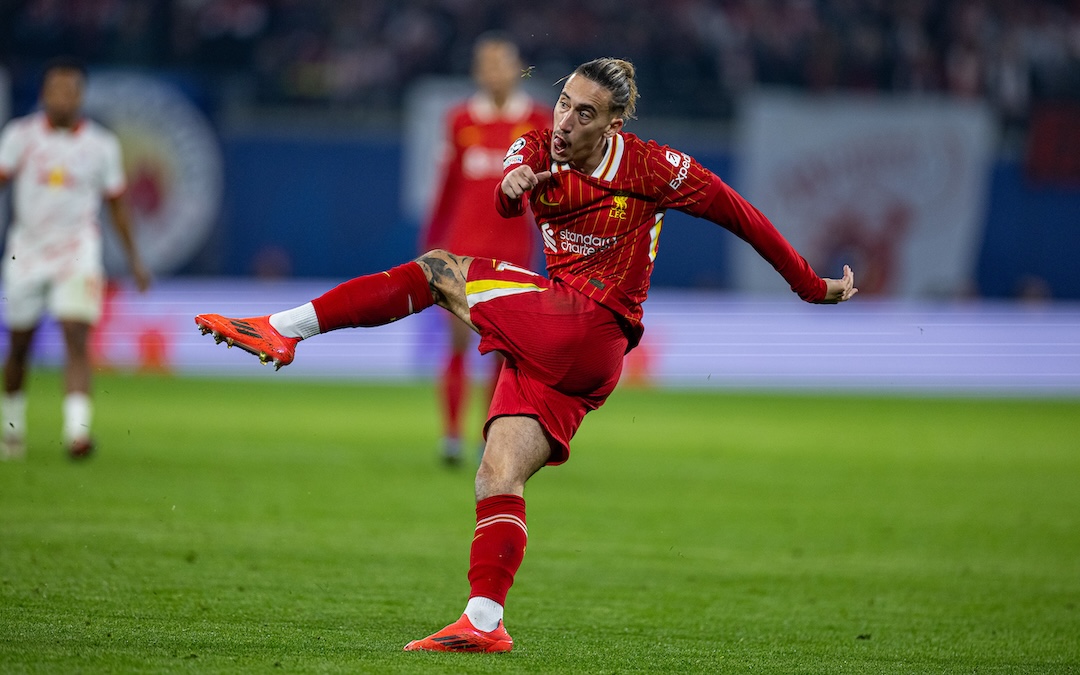Kostas Tsimikas is a footballer who divides a opinion but equally one who carries the curse of only ever being a backup at Liverpool…
THERE was a mention I got a few months ago in the TAW Player Subscribers Facebook group.
The post was defending Kostas Tsimikas and not understanding how contributors, apparently like myself, were queuing up to slaughter him.
I might have criticised him on a show, who knows. But couldn’t remember doing so, or generally being so vehemently against him or any Liverpool player.
Mentioning Tsimikas’s name seems to derive either ambivalence or deep dislike for some.
There have never been any pretensions about the Greek in his press. Neither Jürgen Klopp nor Arne Slot ever touted him as a potential first choice for the position.
He is expected, just like Caoimhin Kelleher, to adhere to the natural order of things. To bow to the superiority of Alisson Becker and Andy Robertson.
The managing of Alisson and Robertson mean opportunities are more plentiful than in other positions on the pitch.
Both players have done a good job in deputising. There has been the occasional error due to lack of sharpness. When both have acquired rhythm, they’ve become an efficient and important part of the unit.
Tsimikas is close to racking up 100 Liverpool appearances with 94. There’s an argument he should’ve surpassed that already, but for his role he’s about par.
Still, there’s a sense you never know what he’s capable of, for better or for worse. There’s the feeling you’re watching him for the first time over and over.
The obvious quality he possesses is deliveries. When he plays, he’s trusted with in-swinging corners and set-pieces. Tsimikas ranks in the 98-to-100th percentile on StatsBomb for xG buildup, passing and deep progressions this season.
He was the provider for Virgil van Dijk’s moment of Wembley euphoria last season.
There are things he isn’t – a dribbler, a monster in the air or a player who you feel loves defending. But then full-back covers multitudes of sins and creates all manner of identities.
Robertson at his best has been a marauder, a terror who won’t leave his man or the action alone. He has been Liverpool’s best left-back in over 30 years by a clear distance.
Growing up watching Liverpool, this was such a problematic position. There were Stig-Inge Bjornabe’s crosses from the halfway line, Dominic Matteo being terrorised by Darren Huckerby, and Christian Ziege’s lobotomy by the time we’d reached the 21st century alone.
Perhaps the most fitting embodiment to division over the position would be the likes of John Arne Riise or Alberto Moreno, players who had obvious quality but were at the scene of far too many crimes.
In Robertson, Liverpool found a gem to fix a problem many had come to believe was beyond reparation. Snippets of Fab Aurelio or memories of Steve Nicol were no longer enough for many.
The same applies to goalkeepers. Alisson allows you to smile when David James displays more concentration at half time against an 11-year-old than in many years of playing for the first team at Anfield.
It’s only when you see Alisson and Robertson that you understand how much you were kidding yourself with others.
Slot seemingly wants his left-back to get the team yards up the pitch. To advance high where there might be more space as opponents look to both nullify and exploit Liverpool’s right.
Some differences, like the underlapping final third runs, are cuter and more subtle in their difference to what Klopp asked.
Whether Tsimikas, or Robertson for that matter, are long-term solutions for Slot remains to be seen.
For now, he’s playing semi-regularly for a team which sits top of the Premier League and hasn’t dropped a single Champions League point.
Could he be better? Yes.
Have I given him a bit of criticism before? Probably.
Would I change anything about him or this current Liverpool team at the moment?
Absolutely not.
Buy Dan Morgan’s book ‘Jürgen Said To Me’ on Klopp, Liverpool and the remaking of a city…












